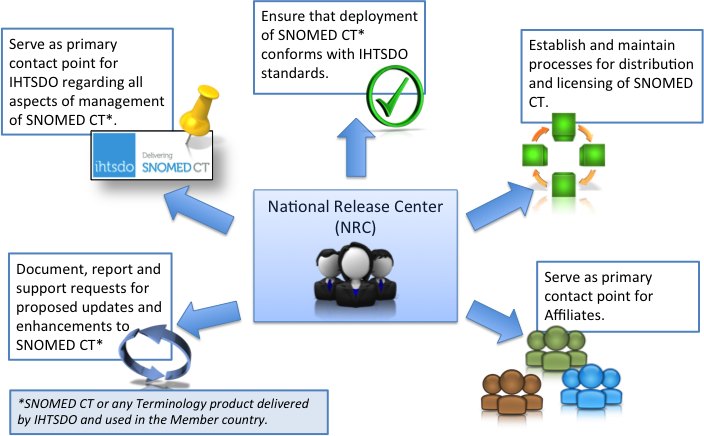The best way to organize an NRC depends on a wide range of factors, including the number of potential Affiliates, the vision and strategy for use of SNOMED CT in the country, the national eHealth infrastructure, the extent of customization, etc. But Members of IHTSDO SNOMED International are, at a minimum, required to fulfill a set of core responsibilities within the Member's territory, as shown in Figure 2 and specified in the Articles of Association. Typically, the NRC fulfills most of these obligations, however a Member may make other arrangements to fulfill some of the obligations.
The Articles of Association for IHTSDO SNOMED International can be found here: http://snomed.org/articles.
...
| Anchor |
|---|
| _Ref275774931 |
|---|
| _Ref275774931 |
|---|
|
Figure 2 Obligations of IHTSDO Members. 
- NRCs are required to serve as primary points of contact for IHTSDO SNOMED International with regards to all aspects of the management of the terminology products.
- NRCs are the primary points of contact for Affiliates within a Member country.
- Affiliates should be able to contact the NRC for guidance and direction with respect to implementation and use of SNOMED CT within the Member country.
- The NRCs should serve as intermediaries between the Affiliates and the SNOMED CT community, for example:
- Encouraging experts and other appropriate persons to contribute to the work of IHTSDOSNOMED International;
- Assisting IHTSDO SNOMED International to communicate with Affiliates and experts entitled to and wishing to be enrolled as IHTSDO SNOMED International Affiliates.
- NRCs are required to establish and maintain processes necessary for distribution and licensing of SNOMED CT and the otherterminology products.
- This includes developing the appropriate mechanisms for users to gain access to National (where applicable) and International Editions of SNOMED CT and related products, and mechanisms to retrieve and manage Affiliate licenses. (See section 9 on tooling for process support.)
- This includes managing license reporting annually and reporting Affiliates' activities in non-Member countries to IHTSDOSNOMED International.
- NRCs are required to ensure that any deployment of a terminology product owned by IHTSDO SNOMED International conforms to IHTSDO SNOMED International standards.
- NRCs must facilitate feedback from users on SNOMED CT, including managing change requests.
...
The competencies required for an NRC are dependent on what services the NRC chooses to deliver. However, most NRC staff should have a general understanding of SNOMED CT and IHTSDOSNOMED International.
If an NRC is unable to provide a specific type of service, it should seek to identify other resources that are able to meet the requirements of implementers and users in the Member country.
The following core competencies are typical for the work of an NRC. Some of these competency areas can be considered assignment-specific, as they will not be required as a constant competency within the NRC but are required to fulfill specific assignments, such as translation, mapping and development of Reference sets.
...
Tasks | Main competencies | Knowledge/Skills areas |
|---|
Distribute International Release and National Extension | - Communication
- Technical/IT
| - Communication with Affiliates, e.g. news updates
- Tooling support for access to the International Release and National Extension
|
| Manage extensions | | |
| - Terminology
- Domain specialty
- Translation
| - Content development
- Terminologies, description logic
|
| | - Tooling support for extension development and management
(See "Technical/IT" responsibility)
|
| Manage Reference sets | | |
| - Terminology
- Domain specialty
(clinical experts, etc.)
| - Reference set development and maintenance
- Domain insight, depending on the purpose of the Reference Set
- Concept selection
- Logical and concept model
- Search techniques
|
| | - Tooling support for Reference set development and management
(See "Technical/IT" responsibility)
|
| Manage Mappings | | |
| - Terminology
- Domain specialty
| - Map development and maintenance
- Knowledge of current practice for use of classifications and terminologies in the Member territory
|
| | - Tooling support for Reference Set development and management
(See "Technical/IT" responsibility)
|
Tooling Developments - Browsing, Developing
content, and Refsets,
QA, Distribution
| | - SNOMED CT technical specifications and File formats
- Software and database design and development
- Information modeling/information model standards
- SNOMED CT search and data entry techniques and software
- Authoring and distribution requirements
- Quality assurance techniques
|
Manage translations | - Terminology
- Linguistics
- Domain specialty
| - Translation processes
- Concept definition
- Quality assurance
- Terminology authoring technology
|
Change requests | - Communication
- Terminology
- Translations
| - Content development
- Terminologies, description logic
|
| | - Terminology authoring tool
- Tooling support for change request submissions and management of change requests.
(See "Technical/IT" responsibility)
|
Education, promotion and training
Engaging stakeholders | - Communication
- Implementation
- Education
| - Dissemination competencies
- Users and user needs
- Broad and deep knowledge of SNOMED CT, users and implementation aspects.
- Examples, use cases
- National health IT-infrastructure, current practices and regulation
|
Implementation consultancy | - Implementation
- Technical/IT
- Business Analysis
| - Broad and deep knowledge of SNOMED CT, users and
implementation aspects. - Examples, use cases
- Implementation levels and technical opportunities
- Ability to understand requirements and relate to terminology
|
Manage licenses (manually or automatically) | - Communication
- Technical/IT
| - Communication with Affiliates
- Tooling support, e.g. license repository
|
...